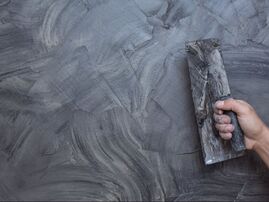 here are several benefits of stucco. It is fire-resistant, durable, customizable, and inexpensive. No wonder it is an extremely popular building material. So, if you are considering using stucco for your next home improvement project, then congratulations! You are on the right track. Once you have made up your mind, the first thing to do is find the right stucco contractor in Calgary for your project. How you get your stucco installed will significantly impact its performance and lifespan. An experienced stucco contractor knows what precautions to take to ensure stucco adheres properly and lasts for years to come. Here are some tips for hiring a skilled and experienced stucco contractor. Consider Their Experience Look for a professional with years of experience handling stucco repair, installation, and maintenance projects from start to finish. An experienced contractor knows what type of issues they can face during the different stages of a project and how to circumnavigate them. An experienced contractor has the skills and know-how to develop customized solutions to fit their clients' specific needs. Talk to Friends and Family If a friend or family member has just wrapped up a stucco installation, repair, or maintenance project, ask them about their experience working with their contractor and if they'd use them for their future projects. Ask them if the contractor was professional and whether the project was delivered on time and within budget. Check Their Online Reputation You must check the contractor's online reputation that you're considering. Find out what people are talking about the professional. Visit third-party, reliable review sites such as Yelp, Yellowpages, and Angie Reviews to check customer reviews. Check the business at the BBB. Visit Their Website After landing on a contractor's website, the first thing to do is check their previous work. Determine if they have the expertise and skills required to handle your project. Talk to References A reputable contractor would be more than happy to provide references. If a contractor refuses to provide references, walk away. Talk to their references instead of taking everything a contractor says at face value. A few questions to ask a stucco contractor's references are ➢ Did the contractor meet your expectations? ➢ How was your experience working with that contractor, subcontractors, and suppliers? ➢ Was the project delivered on time and within budget? If not, why? ➢ Did the contractor explain all the cost elements to you in detail? ➢ Did their crew clean up after the project? Compare Prices Get at least three quotations from three different contractors. When analyzing a quote, check the cost elements and their breakup. If you have difficulty understanding a particular cost element, do not hesitate to call the contractor's office. When comparing quotes, be sure to consider the type and nature of services offered. Do-All Stucco & Stone is a top-rated stucco contractor. No matter how complex your project is, we can manage it. We also offer top-notch soffit and fascia installation services in Calgary. To learn more, call 403-588-5306.
0 Comments
 Plaster and stucco are among the most common building materials. They have similar properties and have a range of benefits. Both stucco and plaster are known for their superior durability and fire resistance. They are generally low-maintenance. Despite these similarities, plaster and stucco are different building materials. If you cannot decide which material is best for your project, you have come to the right place. To help you make an informed decision, we take a look at some differences between plaster and stucco. Composition Stucco is a type of plaster, but plaster is not necessarily stucco. Exterior plaster is usually a mixture of lime, plaster of Paris, and water. On the other hand, stucco is a mixture of lime, sand, and Portland cement. The composition of plaster and stucco affect how they are applied and the areas in which they could be used. Versatility Plaster is more versatile than stucco. Stucco can only be applied to some types of surfaces, whereas plaster can be applied to smooth, even surfaces and rough, uneven surfaces. In addition, plaster can be molded to create custom designs. Stucco cannot be poured into molds. Installation Stucco and plaster should be installed by an expert with an in-depth understanding of these materials. Stucco is usually installed in three layers over a wire lath (similar to a wire mesh). The lath gives the stucco a surface to adhere to. The first coat is a scratch coat, the second is a brown coat, and the top coat gives the stucco its unique appearance. Exterior plaster can be applied the same way (in three layers). If you do not want to apply plaster in three layers, use gypsum veneer (it can be applied in a single coat). Application Plaster can be applied directly to interior and exterior surfaces, whereas stucco is exclusively meant for exterior use. In addition, stucco has a rougher texture than plaster and is more durable than many different types of plasters. That said, plaster can be applied to more types of surfaces. Before applying stucco, the surface should be prepared properly. Preparing a surface to apply plaster is usually a less-time consuming task. Can Stucco be Installed Over Plaster? Yes, if the surface was prepared properly, you can install stucco over plaster. Over time, plaster can accumulate dirt. Therefore, before applying stucco over plaster, clean the surface to remove dirt, dust, grime, and debris. If you don’t clean the surface properly, the stucco won’t adhere. After cleaning the surface, give it time to dry. Before applying stucco, make sure the surface is completely dry, moisture can get trapped in the wall, and your stucco could crack or chip in the future. Do-All Stucco & Stone is a leading stucco contractor in Calgary. We are your go-to team for stucco repair in Calgary. Our pros have years of experience installing and maintaining stucco. To learn more, call 403-588-5306. |
Categories
All
|
Red Deer’s First Choice in Stucco Contractors

 RSS Feed
RSS Feed